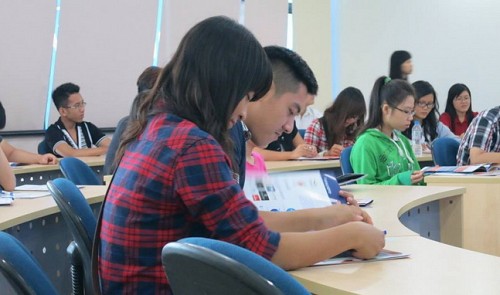Viet Nam college follows Harvard, apparently, to ban lecturer-student romance
While love is one of the most profound emotions known to human beings, a U.S.-invested college in Ho Chi Minh City believes it is not something a lecturer should have with his or her students.
Teachers at the American Polytechnic College (APC) shall lose their job if they are found in a relationship with their students, according to a rule imposed by the president, Dr. Hoang Anh Tuan Kiet.
Any kind of romantic relationship, whether it is true love or the ‘love for higher scores,’ will be deemed breaching the rule, which the school suggests is modeled after Harvard University.
Local media have reported several cases in which lecturers asked students for ‘love,’ or sometimes sex, in exchange for higher scores that would enable them to pass exams. In other cases, the students deliberately seduced their teachers for similar purposes.
APC will keep a close watch on the relationship between its lecturers and students, whereas tip-offs, from students or teachers alike, are welcome, Kiet was quoted by newswire Zing as saying.
No such romance has ever been detected in the school, located in the outlying district of Binh Chanh, according to the president.
 |
| Students attend a class at the American Polytechnic College in Ho Chi Minh City in this photo posted on the school's Facebook page. |
APC now wants its teachers not to date their students or have lunch or dinner with them. If they are to meet in the school offices, it is mandatory that the doors be left open.
Kiet said he prepared the rule based on an “important and basic philosophy” of Western education, which he has learned from his years working at France’s atomic energy institute.
The president, who graduated from South Korea’s Sungkyunkwan University, insisted that schools should create “a safe and fair environment.”
Earlier this year, Harvard University also banned its professors and students from falling in love with each other, Kiet said, apparently implying he is only following the model of one of the world’s most prestigious universities.
The APC ban, however, has received mixed responses from its teachers and students, as well as members of the public.
Zing said the school’s lecturers have embraced the rule, whereas students regard it as an “outdated regulation.”
College students are above 18 years old and it is unreasonable to intervene in their romantic relationships, according to naysayers.
APC chairman Dr. Tran Vinh Du said the romance ban will only benefit teachers and students.
APC only bans lecturers from having a romantic relationship with those students who are still studying at the school.
The chairman said it is possible to watch over the APC teachers, thanks to the surveillance camera system installed on its campus.
Things will be more complicated when they date students outside the school fence, he admitted.
Du underlined that the ban is applied only to lecturers, which means students will not be penalized for the romance they start with their teachers.
APC is a member of the Institute of American Education, and is invested by American investors and organizations, according to the school’s website.
The school has many famous Vietnamese experts in the fields of education, finance, economics, and media on its management board.
The APC offers a wide range of majors, including business administration, hospitality, finance, media, graphic design, among others.